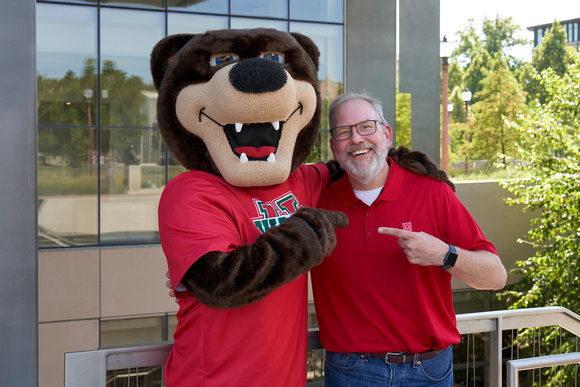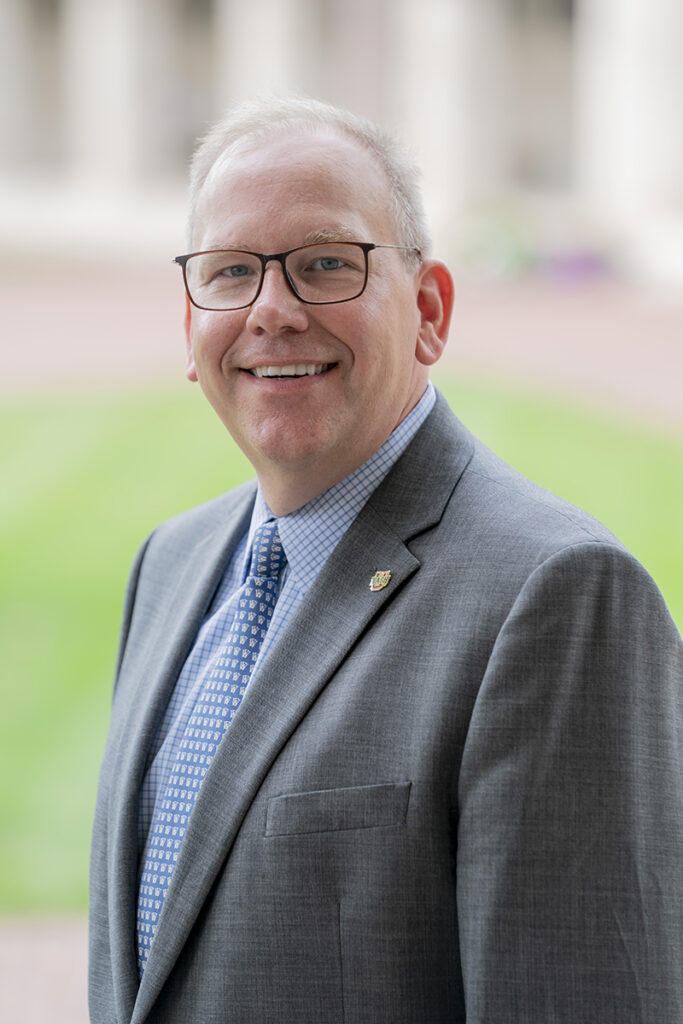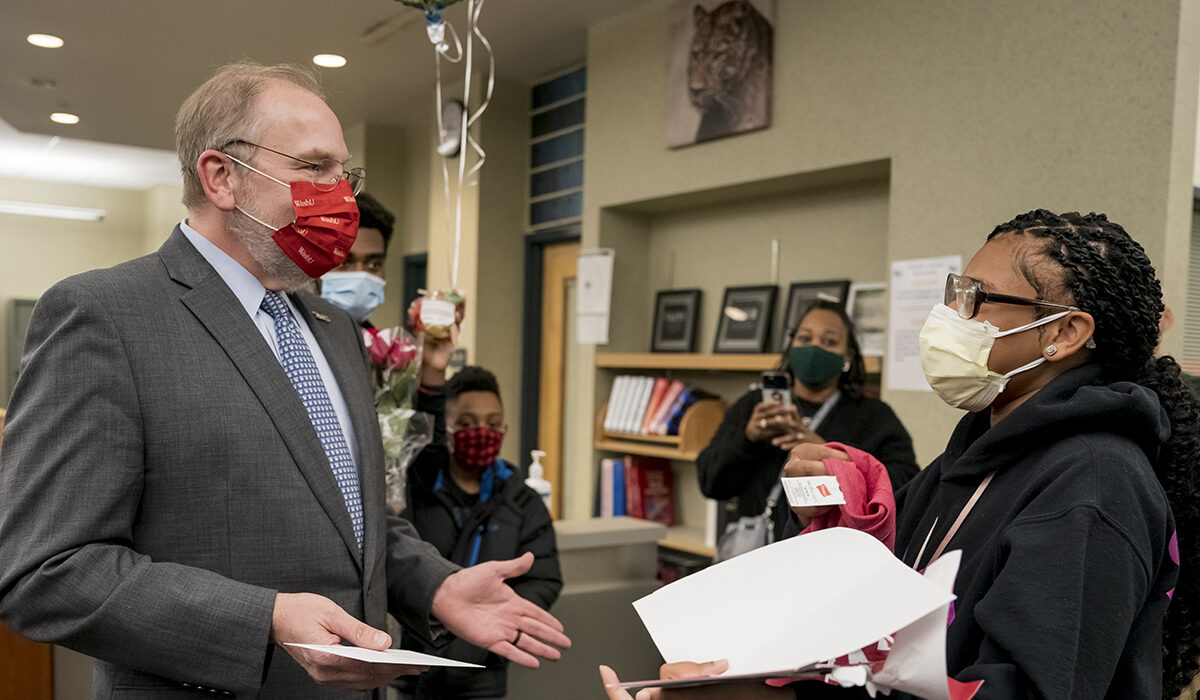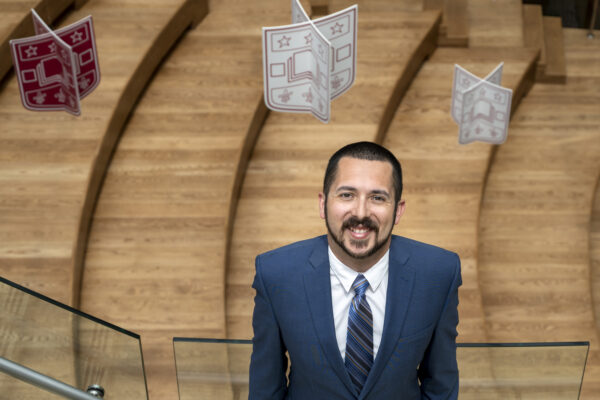For years, college counselor Chat Leonard struggled to find the right expert to speak to families about financial aid. One was too dull, boring the audience with FAFSA speak. Another was too intense, overwhelming already anxious parents.
Then she met Mike Runiewicz, assistant vice provost and director of Student Financial Services of Washington University in St. Louis. Runiewicz arrived at her financial aid night at Clayton High School with a stack of business cards and a willingness to stay until every question was answered.
“You could literally hear the room exhale when he finished,” recalled Leonard, who recently retired from Metro Academic and Classical High School in St. Louis Public Schools after previously serving students in the Clayton and Parkway school districts. “He is such a clear communicator and such a calming presence. Year after year, I knew I could count on Mike.”
The same can be said for countless Washington University families. Whether meeting one-on-one with a new student or modeling a bold initiative like the university’s new need-blind admissions policy, Runiewicz is committed to making Washington University more accessible to students, said Ronné Turner, vice provost of admissions and financial aid.
“A lot of people in Mike’s position are quick to say, ‘No, we can’t do that.’ Not Mike,” Turner said. “Whenever I come to Mike with an idea, he’ll say, ‘Hmm, let me think about that.’ And then he makes it happen — modeling the cost and figuring out how to make things work within the WashU environment.”
Empathy for students
Runiewicz joined Student Financial Services almost two decades ago. He had no experience in higher education, but a career in finance taught him how to talk dollars and cents in a way anyone can understand. And his own complicated family history gave him an empathy for students who have bigger dreams than bank accounts.
Since then, Runiewicz has helped model and implement a number of new initiatives, including Gateway to Success, the $1 billion investment in financial aid that allowed the university to adopt a need-blind admissions policy. Other significant aid programs include the WashU Pledge, which provides a free undergraduate education to incoming full-time students from Missouri and southern Illinois with family incomes of less than $75,000; and first-year grants, which cover the cost of a computer and other college essentials.
These changes and many more were introduced after a 2013 New York Times article that called out the university for its woefully low number of Pell-eligible students, about 7% at the time. Runiewicz, who was a first-generation, low-income college student himself, said the story made him feel sick.

“The numbers were real. We had started to move in the right direction, but there was no denying we had a lot of work to do,” Runiewicz said. “But what started as an embarrassment became a call to action. The university made a commitment to provide more resources, and that commitment has just grown. And now 20% of our first-year class is Pell-eligible. I’m incredibly proud of our progress, but I couldn’t do what I do without that support from the university and our great team.”
Runiewicz grew up in South Florida, the oldest of three children. His family didn’t have a lot of money, so Runiewicz worked long hours delivering newspapers. He was accepted into a number of schools, but he chose the University of Florida because it was the only school he could afford — and just barely. Because Runiewicz’s father refused to pay federal income tax, Runiewicz could not apply for financial aid.
“My parents always thought that when the time came, they would be able to help, and they just couldn’t. That money was never going to be there,” said Runiewicz, who majored in economics. “So I increased my hours at Domino’s and took off a couple of semesters to make money. I was able to see my way through, but this was in 1992 when, in theory, you could work your way through college. That’s not the case today.”
Runiewicz is not bitter, but for a long time he was embarrassed to talk about his family’s situation. Those memories inform the policies and culture of Student Financial Services. For instance, students work with the same counselor throughout their time on campus.
“We want students to have a relationship with their financial aid counselor and not have to start at the beginning every time they visit,” Runiewicz said. “A student should not have to tell their story over and over to prove that they have need.”
Whether he’s leading on the national stage or meeting with families in local schools or finding a way to get resources to students who need them, Mike always puts students first.
Ronné Turner
Also, Runiewicz works closely with Residential Life, Dining Services, WashU Cares and other campus partners, who alert his office if they observe a student struggling financially. Maybe a parent lost a job. Or maybe the parent cut off a student for switching majors or coming out.
“We see all sorts of situations,” Runiewicz said. “The people in this office are incredibly empathetic. Whether they’ve had similar lived experiences or not, they listen with an open mind.”
Runiewicz also has advocated for streamlining the financial aid process. For instance, when the FAFSA (Free Application for Federal Student Aid) switched to its current prior-prior year model, Runiewicz’s office implemented a new early renewal process. Now, students receive their awards in February instead of May, allowing families to better prepare for the upcoming school year.
In addition, Runiewicz serves on the College Board committee that has developed a new, simpler CSS Profile, the online form students must use to apply for aid at some 300 colleges. Washington University is currently piloting the simpler form. These changes may seem small, but they can make a big difference to families, Turner said.
“Every Commencement, I’ll hear from seniors grateful for the support they received from their financial aid officers,” Turner said. “That’s a testament to Mike. Whether he’s leading on the national stage or meeting with families in local schools or finding a way to get resources to students who need them, Mike always puts students first.”
Financial aid tips from Mike Runiewicz, assistant vice provost and director of Student Financial Services at Washington University in St. Louis

What is the No. 1 misperception that people have about the financial aid process?
The No. 1 misperception people have is assuming that they are not going to qualify for financial aid. The financial aid formula takes into consideration the assets and the income of a family, but it also takes into consideration the cost of a school. So even if a family had a child that didn’t qualify for aid at one school, that family might qualify at a different school because of the higher costs. So, apply for aid — it’s not too late.
The other big misconception that is so ingrained in parents is that a state school will always be the cheapest option. And that is not always the case. Though a private school may have a higher cost, the private institution often will offer more aid.
Is there anything families can do to advocate for the aid they need?
Share your experience. Financial aid forms do a really good job of capturing the dollars and cents of your family. But they do a terrible job of putting your family’s face on that financial aid application. Part of our job in financial aid is putting your family’s face on that information. You can help by communicating with the financial aid office about special circumstances that they should know about.
High school seniors are receiving their college acceptances right now. What should they be looking for in financial aid offer letters?
That is a bit of a charged topic right now. The Government Accountability Office put out a report that found that financial assistance offer letters are not providing enough good information for students. It found most colleges underestimated or did not include the net cost of attendance. So, it is important for families to make sure they are comparing apples to apples. High school counselors can be a great resource to help students make a comparison between schools. Families should call a school’s financial aid office to better understand the net price and their out-of-pocket costs.




Comments and respectful dialogue are encouraged, but content will be moderated. Please, no personal attacks, obscenity or profanity, selling of commercial products, or endorsements of political candidates or positions. We reserve the right to remove any inappropriate comments. We also cannot address individual medical concerns or provide medical advice in this forum.